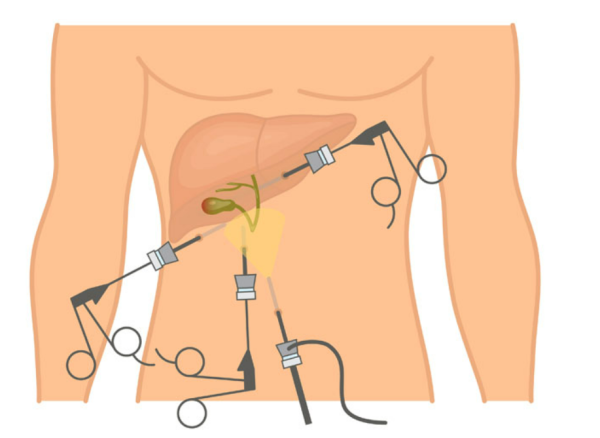Do You Have Gallstones? Laparoscopic Gallbladder Removal Explained
Cholecystectomy: Everything You Need to Know About Gallbladder Surgery

Benign gallbladder conditions, such as symptomatic cholelithiasis and gallbladder polyps, are the most common reasons for undergoing a cholecystectomy (removal of the gallbladder).
• Cholelithiasis: This refers to the presence of gallstones that can cause symptoms like intense abdominal pain, especially after consuming fatty foods.
• Gallbladder polyps: These are small growths in the gallbladder wall that may require removal if they exceed 10 mm in size or present characteristics that suggest a risk of malignancy.
Why Is Treatment Important?
If left untreated, symptomatic cholelithiasis can lead to severe complications, including:
• Cholecystitis: Acute inflammation of the gallbladder.
• Biliary colic: Intense pain caused by the movement of gallstones.
• Biliary obstruction: Results in pain and jaundice (yellowing of the skin and eyes).
• Pancreatitis: Inflammation of the pancreas due to bile duct obstruction.
These complications can cause severe pain, infections, and irreversible damage to organs like the liver and pancreas. For this reason, laparoscopic cholecystectomy is highly recommended for patients with recurrent symptoms.
What Is Laparoscopic Cholecystectomy?
Laparoscopic cholecystectomy is the standard surgical procedure for removing the gallbladder. This minimally invasive technique involves making small incisions in the abdomen through which a camera and specialized surgical tools are inserted.
Benefits of Laparoscopy:
• Less postoperative pain.
• Faster recovery (typically within a few days).
• Lower risk of infections and minimal scarring.
• Shorter hospital stay.
Who Should Consider This Surgery?
Patients experiencing symptoms of cholelithiasis or diagnosed with gallbladder polyps should seek evaluation by a specialist in general and digestive surgery. Early diagnosis and appropriate surgical intervention are essential to prevent complications.
If you are experiencing recurrent abdominal pain, discomfort after meals, or have been diagnosed with gallstones or gallbladder polyps, don’t hesitate to contact us.
Patients Reviews
Carlos B
Manu P
For me, it has been an enormous stroke of luck to put myself in his hands for a pathology that is so difficult to treat and complicated to resolve. My most sincere thanks and all my love to Dr. Alevizos
NGQ
I have been operated on twice by Dr. Alevizos, and without a doubt, he is a great professional who is caring and deeply involved with his patients. I felt absolute peace of mind in his hands. Thank you for everything, Dr. Leonidas!
Francisco J
Without a doubt, Dr. Leonidas is a spectacular surgeon, in addition to providing gentle, kind and reliable treatment. I was lucky enough to be operated on by him for a pilionidal cyst after having previously been operated on twice without obtaining good results... until I put myself in the hands of Dr. Leonidas, who thanks to his intervention after almost two years, I am in perfect condition. been and I haven't had any problems again!
Alejandro R
Dr. Leónidas provides peace of mind and shows genuine interest in his patients. He is professional and, above all, very human. Thank you, Dr. Leónidas.
JM
I had stomach surgery by surgeon Leonidas Alevizos and noone can imagine the great quality of life he gave me. His history with me was always his absolute concern for my digestive problems and there was not a single consultation in which I did not feel understood or supported. His psychology with me was excellent, my post-operative period was very monitored by him and I could not have felt more cared for at the time when I felt most vulnerable.
MLS
Grateful from the first moment for the humane treatment that the doctor gave me. He was attentive to any problem or doubt
Agustín H
Need a Speciallist?
